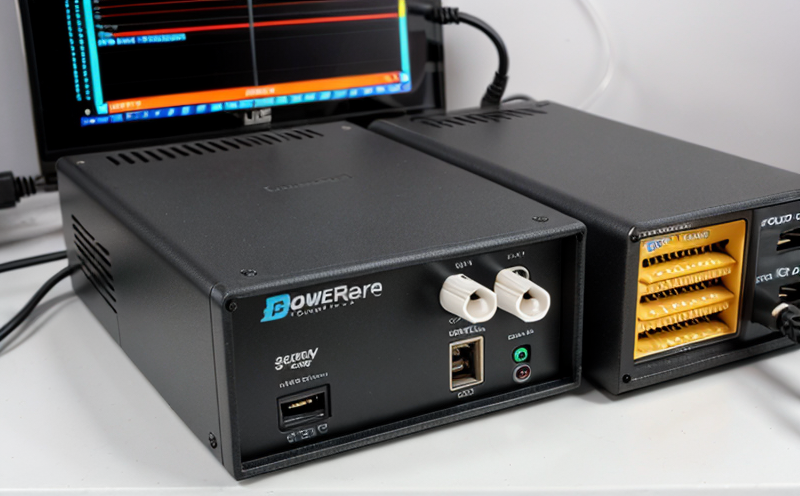IEEE 118 Reliability Testing for Power Systems and Chargers
The IEEE Standard 118, "Recommended Practice for Designing Reliable AC Power Systems," is a crucial guide in ensuring the reliability of power systems. This standard addresses the design criteria, testing methods, and acceptance criteria that help maintain the integrity and reliability of alternating current (AC) power systems.
In this context, IEEE 118 reliability testing specifically targets the components that form part of these AC power systems, with a focus on power supplies and chargers. The goal is to ensure these components meet stringent reliability standards under various operating conditions. This service ensures compliance with international standards such as ISO/IEC 27036 for IT equipment and IEEE P1548 for energy storage systems.
The testing process involves a comprehensive examination of the power supplies and chargers, evaluating their ability to withstand voltage fluctuations, temperature changes, and other environmental stressors. This service is particularly important in sectors like consumer electronics, automotive, and telecommunications where reliability is paramount for both safety and performance.
Our laboratory uses advanced test equipment such as network analyzers, power quality simulators, and thermal imaging cameras to ensure accurate and reliable testing results. The testing process typically includes:
- Initial inspection of the sample
- Voltage and current measurement under steady-state conditions
- Thermal cycling tests to assess long-term reliability
- Vibration and shock tests for mechanical integrity
- Environmental stress screening (ESS) to identify potential issues early on
The results of these tests are meticulously documented, providing detailed reports that can be used for quality assurance, compliance verification, and continuous improvement. This service not only ensures regulatory compliance but also enhances the reputation of brands by demonstrating a commitment to quality and reliability.
| Testing Parameter | Acceptance Criteria |
|---|---|
| Voltage Stability | ±2% variation from nominal voltage over the operating range |
| Current Capability | 110-115% of rated current for continuous operation |
| Thermal Performance | Operational temperature not exceeding 70°C under specified conditions |
| Vibration Resistance | Survival through a standard vibration test without damage or failure |
The IEEE 118 reliability testing service is designed to meet the stringent requirements of quality managers, compliance officers, R&D engineers, and procurement professionals. By adhering to international standards, our laboratory ensures that power supplies and chargers are not only reliable but also safe for end users.
Applied Standards
The IEEE 118 reliability testing service is grounded in several key standards that ensure the highest level of accuracy and consistency. These include:
- IEEE Standard 118
- ISO/IEC 27036 for IT equipment reliability
- IEEE P1548 for energy storage systems
The IEEE Standard 118 provides a framework for the design and operation of AC power systems, ensuring that they meet reliability criteria under various conditions. This standard is essential for industries relying heavily on reliable power supplies and chargers.
ISO/IEC 27036 focuses on information technology equipment reliability, which is crucial for ensuring that power supplies and chargers operate without failure in demanding environments. The IEEE P1548 addresses the unique requirements of energy storage systems, integrating them into AC power systems to enhance overall reliability.
Industry Applications
The IEEE 118 reliability testing service is widely applicable across several sectors. Here are some key industries and applications:
- Consumer Electronics: Ensuring that power supplies in smartphones, tablets, and other devices meet stringent reliability standards.
- Automotive Industry: Testing power systems for electric vehicles (EVs) to ensure they operate reliably under various conditions.
- Telecommunications: Providing reliability testing for base station power supplies to maintain uninterrupted communication services.
- Medical Devices: Ensuring that chargers and power supplies in medical devices meet strict reliability criteria.
In each of these sectors, the IEEE 118 reliability testing service plays a critical role in ensuring that power systems and chargers operate reliably under all conditions. This is particularly important for industries where downtime can lead to significant financial losses or safety risks.
| Industry | Main Application |
|---|---|
| Consumer Electronics | Smartphone and tablet power supplies |
| Automotive Industry | Electric vehicle charging systems |
| Telecommunications | Base station power supplies |
| Medical Devices | Chargers and power supplies for medical equipment |
Environmental and Sustainability Contributions
The IEEE 118 reliability testing service not only enhances the performance of power systems but also contributes to environmental sustainability. By ensuring that power supplies and chargers are reliable, we help reduce waste and promote energy efficiency:
- Reduced Waste: Reliable components last longer, reducing the need for frequent replacements.
- Energy Efficiency: Reliability testing ensures that power systems operate efficiently, minimizing energy consumption.
- Safety: By ensuring compliance with international standards, we help prevent accidents and reduce environmental hazards associated with failed equipment.
The IEEE 118 reliability testing service is a key component of our commitment to environmental sustainability. It helps ensure that power systems operate reliably, contributing to a more sustainable future.





